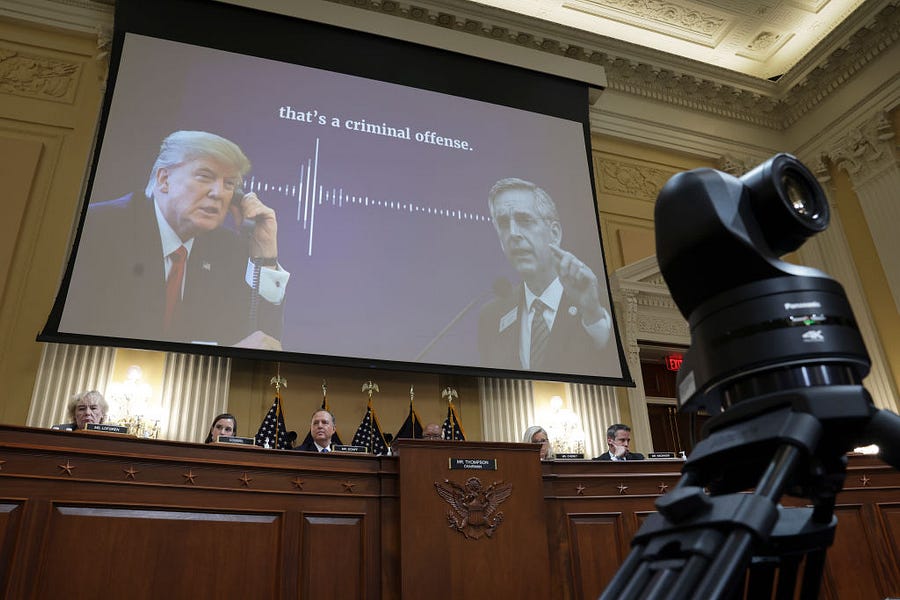Will the Jan. 6 committee issue a “criminal referral” to the Justice Department for Donald Trump? Committee members can’t give an interview without being asked that question. Pundits can’t stop talking about it, cable TV anchors can’t stop asking legal experts for their predictions. It’s nothing less than a media obsession.
Trouble is, it’s a silly question.
Don’t get me wrong. Whether or not Trump committed crimes—and what to do about it if he did—is profoundly serious stuff. And so is the committee’s investigation. But rarely has so much passion and studied seriousness been devoted to the trivial issue of a congressional criminal referral.
You know what that is? A letter saying, in effect, “Please look into this.” If it comes from the chair of a committee, the Department of Justice traditionally responds in writing or by phone. That response usually amounts to “Thanks, we’ll look into it. Maybe.”
If it comes from an ordinary member of Congress, the DOJ might not even do that much. Why? Because it’s a classic congressional P.R. stunt. A former DOJ official tells me you could probably wallpaper the Hoover building with Republican criminal referrals for Hillary Clinton alone.
You know who else can make a criminal referral? You! Just go to the FBI website or call the local office.
Apparently, there is only one U.S. statute that gives any special treatment to congressional criminal referrals—2 U.S.C. 194. This lays out the guidelines for contempt of Congress. But there’s no special law covering anything else. As former federal prosecutor Andrew McCarthy writes, “it makes no material difference to the DOJ whether a committee transmits a formal referral (‘we believe Andy robbed the bank’) or instead issues a public report describing its conclusions (‘An Investigation into the Awful Things Andy Did at the Bank’). It is just the communication of an accusation.”
Now, as a political matter, a criminal referral about a former president is a big deal, particularly given the specific crimes Trump could be charged with.
But a criminal referral from the committee is at best unnecessary and at worst counterproductive. Attorney General Merrick Garland already said last month he’s watching the hearings closely. More importantly, he’s already investigating. Alleged Trump conspirator Jeffrey Clark, a former assistant attorney general, had his home raided by the FBI on June 22. In short, there’s nothing additional the DOJ would do—or not do—if it received a referral from Congress.
Right now, everyone benefits from this widespread ignorance. The implication that there is some special weight to a criminal referral makes this all seem like more of a criminal proceeding than it actually is. That justifies breathless “will they or won’t they? Stay tuned to find out!” media speculation and coverage. Obviously, it’s catnip for those who want Trump prosecuted.
But it also contributes to the martyr complex of Trump supporters who desperately—and relentlessly—try to paint this inquiry as a Stalinist show trial, Salem witch hunt or some other kangaroo court. This is all nonsense, Stalin’s show trials involved manufactured evidence and confessions extracted from torture. The Jan. 6 committee struggles to get compliance with subpoenas.
But pretending a criminal referral is a big deal lends weight to the nonsense. If the committee was actually a criminal proceeding, it would be a grotesque violation of due process and a farce. But it’s not. It’s a poorly designed, but ultimately essential, fact-finding effort. And it’s pretty obvious who doesn’t want the facts to be found.
There’s ample blame to go around for the one-sided nature of the committee. But as much as I agree with the committee’s goals, there’s no disputing that it’s not giving the Trumpists anything like equal time. It’s nothing like a Stalinist show trial, as critics bleat and moan, but neither is it an impartial inquiry of the sort required to determine criminal guilt—or even the sort required to launch a criminal investigation.
The Justice Department follows its own procedure, guidelines and counsel for such investigation. In this case, perhaps more than any other, it should stay that way.
A simple report laying out the already compelling evidence would have the same legal effect as a criminal referral. But unlike a simple report, the political effect of a criminal referral could be hugely negative—because the misperception that the Justice Department follows Congress’ orders could turn into the misperception that the only reason the department prosecuted at all was because of a one-sided, “partisan” committee made a criminal referral. That would be a political gift to Trump and a gigantic unforced error.







Please note that we at The Dispatch hold ourselves, our work, and our commenters to a higher standard than other places on the internet. We welcome comments that foster genuine debate or discussion—including comments critical of us or our work—but responses that include ad hominem attacks on fellow Dispatch members or are intended to stoke fear and anger may be moderated.
With your membership, you only have the ability to comment on The Morning Dispatch articles. Consider upgrading to join the conversation everywhere.